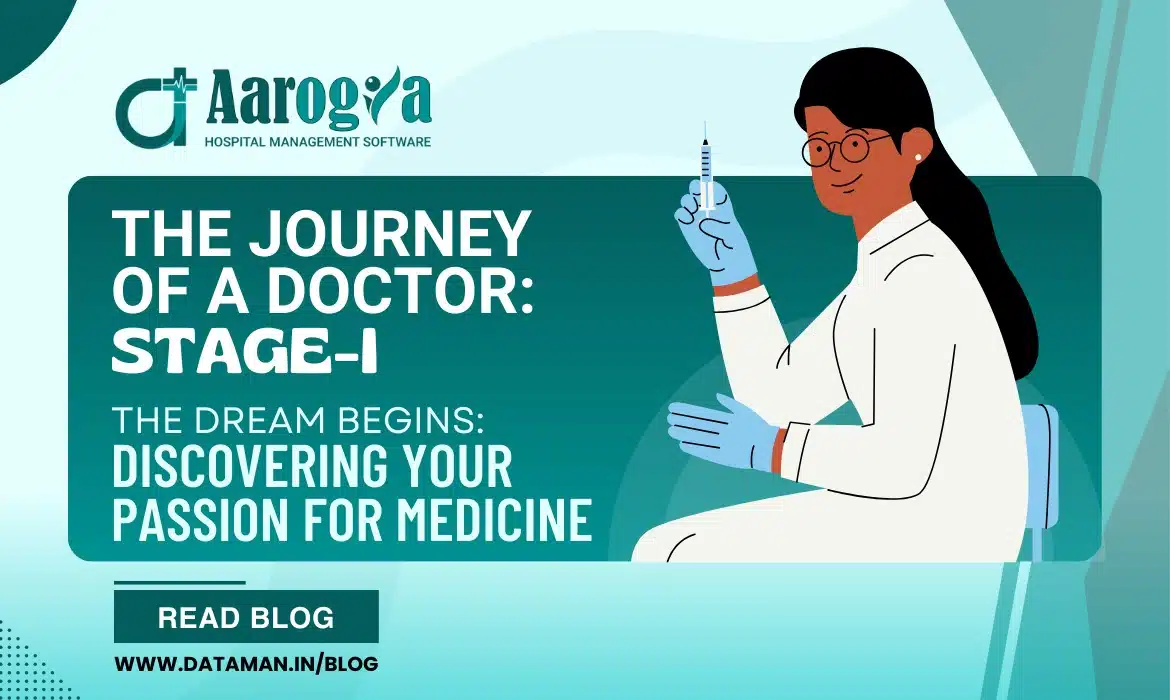- +91 9511117684
- shweta@dataman.in

Table of Contents
Post Views: 8,781
Did you know that most doctors spend an average of 11-16 years in education and training before they are fully licensed to practice? Without passion, such a long journey can seem impossible.
If you’re considering a career in medicine, ask yourself:
- Do you enjoy learning about science and biology?
- Are you curious about how the human body works?
- Do you feel fulfilled when you help others?
Becoming a doctor is not just a career choice—it’s a calling that requires passion, dedication, and a deep desire to help others. Moreover, It is a profession that commands respect and offers the opportunity to make a profound impact on people’s lives.
In this blog, we’ll explore how the journey to becoming a doctor starts, how to nurture that dream, and the early steps you can take to turn it into reality.
1. The Importance of Passion
Every great journey starts with a spark. But what truly drives a person to become a doctor? The answer lies in passion. A passion for medicine is what sustains doctors through years of study, sleepless nights, and challenging cases.
According to a 2018 survey by the Association of American Medical Colleges (AAMC), more than 75% of medical students chose the field because they wanted to help people and make a difference in their lives.
Doctors are problem-solvers, caregivers, and lifelong learners. They work tirelessly to diagnose, treat, and sometimes even prevent illnesses.
2. Know the Traits of a Good Doctor
The medical field is demanding, and not everyone is cut out for it.
Doctors in India often face unique challenges, such as working in resource-constrained settings or treating patients from diverse socio-economic backgrounds.
But if you recognize these traits in yourself, you might have what it takes:
Empathy and Compassion
With around 22% of India’s population living below the poverty line, many patients rely on doctors not just for treatment but also for emotional support.
Empathy is more than just a nice quality—it’s crucial for patient outcomes. Research published in the Journal of General Internal Medicine found that doctors who show high levels of empathy have patients with better health results, especially those with chronic conditions like diabetes.
Curiosity and a Love for Learning
Rural areas, where over 65% of Indians reside, often lack advanced medical infrastructure. Doctors must innovate and adapt to these challenges.
Resilience and Determination
India’s healthcare infrastructure is evolving, and doctors often work long hours under high pressure, especially in government hospitals.
Problem-Solving Skills
Doctors have exceptional problem solving skills —they piece together symptoms to find the root cause of problems.
If these traits resonate with you, they will serve as your foundation for the years ahead.
3. Recognizing the Spark Early
For many Indian doctors, their interest in medicine begins in childhood. Perhaps you’ve been inspired by the sight of doctors treating patients in your community or stories of life-saving surgeries. Early exposure to healthcare can strengthen your interest.
Studies show that early exposure to healthcare—whether through family influence or personal experiences—increases the likelihood of pursuing a medical career. About 20% of medical students report having at least one parent or close relative in the healthcare field.
If you’re still in school, here are a few ways to explore your interest:
- Read Science Books and Watch Documentaries: Books about anatomy, human biology, or medical breakthroughs can ignite your passion.
- Participate in Science Fairs: Get hands-on experience by creating biology-related projects.
- Ask Questions: Curiosity is the first step toward learning. Don’t hesitate to ask teachers or professionals about how things work.
- Students can participate in programs like the Kishore Vaigyanik Protsahan Yojana (KVPY) which encourages young students to take up science and research, including medicine.
- India’s first medical college, Calcutta Medical College, was established in 1835. Today, India has over 612 medical colleges, offering numerous opportunities to pursue medicine.
- Over 70% of doctors in India work in urban areas, leaving rural areas underserved. Working in these regions requires patience and adaptability.
- Medical education in India is intensive, with MBBS courses lasting 5.5 years, including a 1-year internship.
4. Volunteering and Shadowing
Volunteering in India offers unique insights into the healthcare system. Shadowing a doctor or volunteering at a local clinic allows you to understand the realities of the profession.
Shadowing and volunteering not only help confirm your career choice but also strengthen your medical school applications. Admissions committees often look for real-world experiences that demonstrate commitment and initiative.
Infact, a study by AAMC.org found that students who shadow doctors are 40% more confident in their decision to pursue a medical career than those who don’t.
Examples of Opportunities:
- Government Hospitals: Many public hospitals, like AIIMS or Safdarjung Hospital, have volunteering opportunities.
- Non-Governmental Organizations (NGOs): NGOs like Goonj and Smile Foundation allow you to work with underprivileged communities and gain exposure to healthcare challenges.
India’s healthcare system is a mix of public and private sectors. While government hospitals provide affordable care, they often face high patient loads. Observing doctors in such settings can help you understand the challenges and rewards of serving in these environments.
5. Exploring Science in School
In India, a strong foundation in science begins at school. The choice of subjects in Class 11 and 12 (Physics, Chemistry, Biology) is crucial for aspiring doctors. Biology accounts for 50% of the NEET syllabus, emphasizing the need for a solid understanding of this subject.
Focus on NCERT Textbooks
NCERT books are the backbone of NEET preparation and provide clear concepts in biology, chemistry, and physics.
Participate in Olympiads
Competitions like the Biology Olympiad or Junior Science Olympiad can sharpen your skills and boost your confidence.
After School, students have to qualify in NEET (National Eligibility cum Entrance Test) to pursue higher education in medicine.
More than 18 lakh students appeared for the NEET (National Eligibility cum Entrance Test) in 2023, making it one of the most competitive exams in the world.
6. Building the Right Mindset
India’s journey toward universal healthcare is still in progress, and the challenges faced by doctors are significant. Developing the right mindset early will prepare you for these realities.
Resilience: The path to becoming a doctor is long and competitive, but persistence is key.
Curiosity: With advancements in fields like telemedicine and AI, the medical profession is constantly evolving. Stay curious and adaptable.
7. Finding Inspiration
Every doctor has a story—a moment when they realized medicine was their calling. Some were inspired by doctors who saved their lives or helped their families. Others found their passion by learning about medical breakthroughs that changed the world.
India has produced some of the most renowned doctors globally, such as Dr. Devi Shetty, a pioneer in affordable cardiac care, and Dr. Prathap Reddy, founder of Apollo Hospitals. Their journeys can serve as inspiration for aspiring doctors.
India has become a hub for medical tourism, with the sector expected to reach $13 billion by 2026. The country’s emphasis on affordable yet quality healthcare provides immense opportunities for young doctors to make a global impact.
Tips for Aspiration:
- Read Stories: Books like Healer: Dr. Prathap Chandra Reddy and the Transformation of India can provide valuable insights into the healthcare industry.
- Speak to Professionals: Many local doctors are happy to share their journeys and advice for aspiring medical students.
- Follow Medical News: Staying informed about new treatments and technologies can fuel your curiosity.
Also Read: ABHA Card Registration – Apply & Download ABHA Card Online
8. Taking the First Steps
If you’ve decided to pursue medicine, it’s time to plan your path. In India, this typically involves the following steps:
Excelling Academically
Focus on scoring well in Class 10 and 12 board exams, as they are prerequisites for NEET.
Preparing for NEET
NEET is the gateway to MBBS and BDS courses in India. Over 90,000 MBBS seats are available across India, but the competition is intense.
Exploring Career Options
In addition to MBBS, consider fields like BAMS (Ayurveda), BHMS (Homeopathy), or BVSc (Veterinary Science) if they align with your interests.
9. The Rewards of Medicine
Despite the challenges, being a doctor in India is deeply fulfilling. With a growing emphasis on healthcare infrastructure and government initiatives like Ayushman Bharat, doctors are making a significant impact on society.
- India’s healthcare expenditure is increasing, with a focus on providing universal health coverage. This is creating more opportunities for doctors in both urban and rural settings.
- The satisfaction of treating patients and improving lives makes all the hard work worthwhile.
Also Read: Understanding IPD vs OPD | Difference Between IPD and OPD
Conclusion
The dream of becoming a doctor in India is both challenging and rewarding. From early sparks of curiosity to the structured path of medical education, every step is an opportunity to grow and make a difference. By understanding the unique landscape of India’s healthcare system and preparing for the journey ahead, you can turn your passion into a meaningful career.
Remember, your journey begins with a single step. Embrace the challenges, stay focused, and keep learning. The dream of becoming a doctor is not just about a career—it’s about making an impact on countless lives.
Stay tuned for the next blog, where we’ll discuss building a strong academic foundation during your school years!
0

